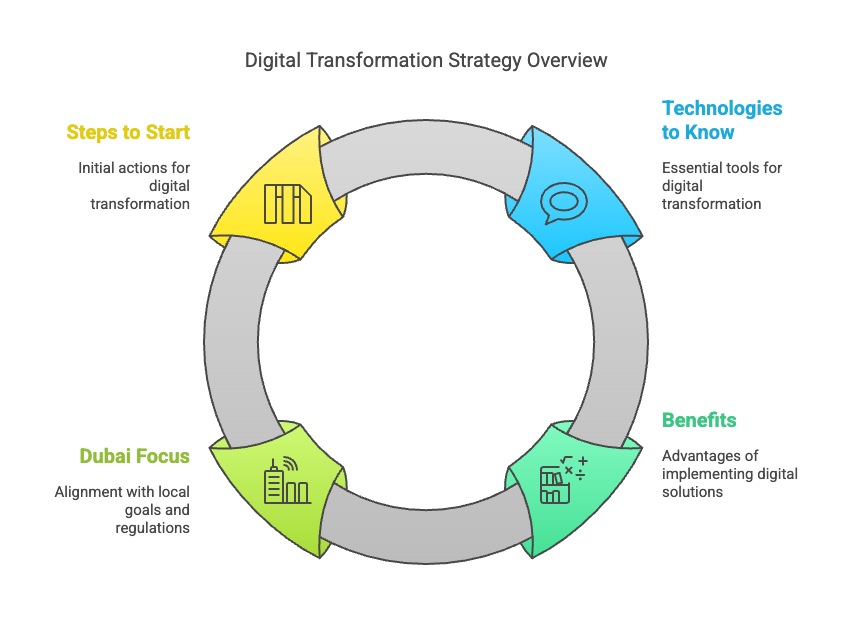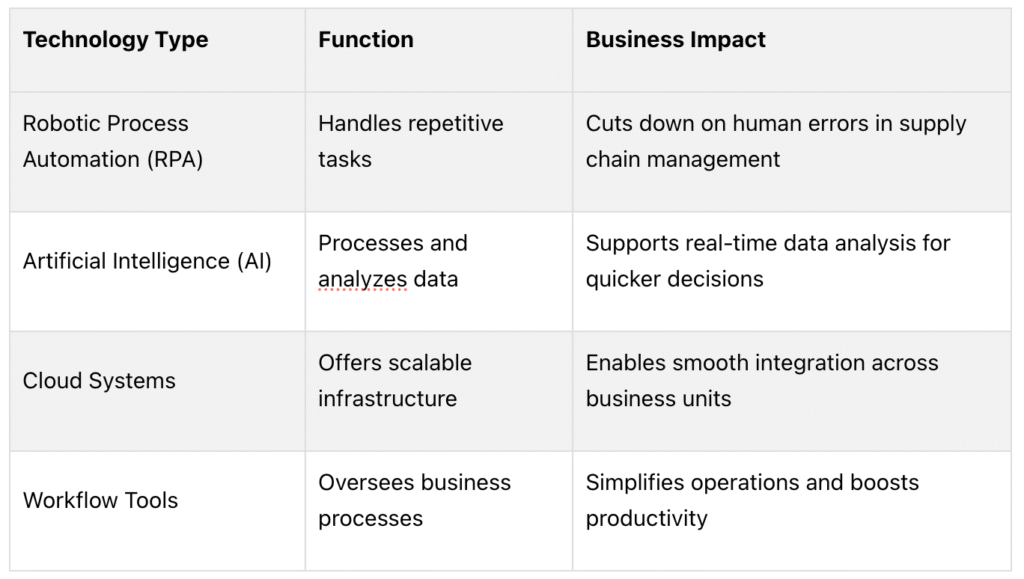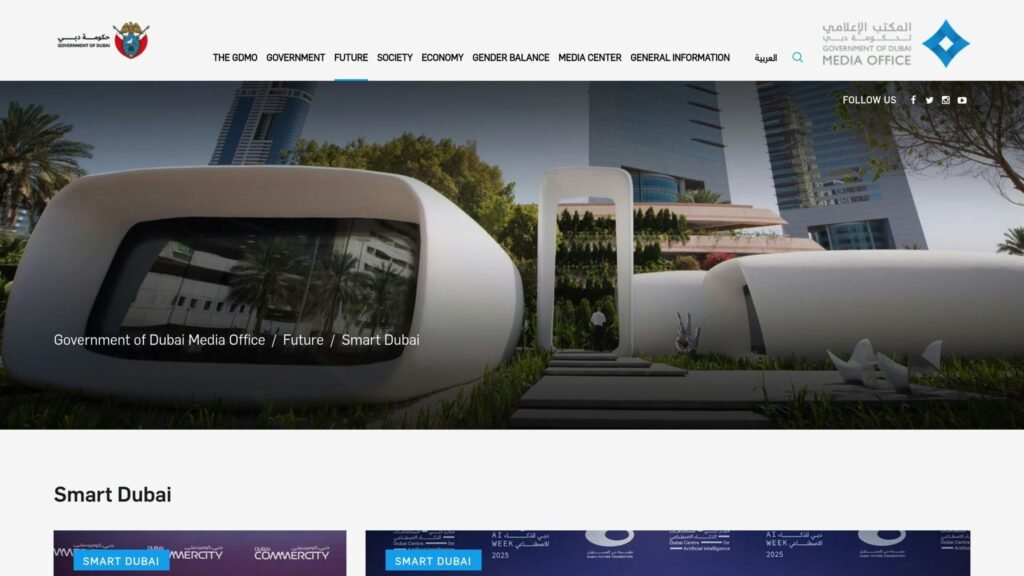
Want to optimize your business in Dubai? Automation is the key. This guide explains how automation can reduce costs, improve efficiency, and help businesses comply with UAE regulations. From AI tools to robotic process automation (RPA), Dubai companies are transforming operations in industries like finance, retail, logistics, and more.

Automation in Dubai isn't just about replacing manual tasks - it's about enabling growth, ensuring compliance, and staying competitive in a fast-evolving market.
RPA for repetitive tasks, AI for real-time data analysis, cloud systems for scalability, and workflow tools to streamline processes.
Save 20-30% on operational costs, enhance customer service with AI chatbots, and improve supply chain accuracy with RPA.
Align with Smart Dubai goals and UAE regulations while tackling challenges like high costs and complex supply chains.
Assess workflows, pick scalable tools, pilot automation in phases, and train your team.
Building on Dubai’s push for digital transformation, this section dives into the essentials of automation.
Business automation involves using technology to take over repetitive tasks and make operations smoother. In Dubai's fast-changing business environment, automation is turning manual processes into efficient digital workflows. This shift helps companies dedicate more time to growth and innovation.
Modern business automation relies on several core technologies:

These technologies work together to create systems that improve efficiency. The next step is figuring out how to integrate them into your existing processes.
Knowing the core technologies is just the start. To integrate them effectively, follow these steps:
System Assessment
Review your current workflows to identify areas where automation can make a difference.
Technology Selection
Pick tools based on these factors:
How well they work with your current systems
Their ability to scale with your business
Built-in security measures
Overall cost and value
Implementation Strategy
Roll out automation in phases to minimize disruptions. Start small with pilot programs before expanding across the company.
Automation doesn’t replace human roles – it enhances them. Employees can focus on strategic, high-value tasks while automation handles the routine. Tailor your approach to fit Dubai’s competitive market and regulatory requirements.

Dubai’s vision to become a Smart City pushes businesses to embrace automation. For example, at DIFC, AI-powered financial services provide real-time analysis and enable faster decision-making [1]. However, achieving this vision also means addressing specific local challenges tied to business operations.
Automation helps Dubai companies overcome key operational issues:
| Challenge | Automation Solution | Business Impact |
|---|---|---|
| High Operational Costs | Process Automation | Simplifies workflows, cutting expenses |
| Customer Service Demands | A.I. Powered Chatbots | Offers 24/7 support and personalized care |
| Supply Chain Complexity | Robotic Process Automation | Reduces errors and boosts productivity |
| Data Management | Localized AI Analytics | Ensures compliance with UAE regulations |
Automation doesn’t just solve problems – it opens doors for growth:
Real-Time Insights: AI tools analyze data instantly, helping businesses spot trends and make informed decisions faster [1].
Scalability: Retailers use AI chatbots to handle operations around the clock without needing extra staff [1].
Streamlined Processes: Logistics companies rely on RPA to simplify supply chains and enhance efficiency through automated workflows [1].
Automation significantly reduces costs and improves efficiency across various areas:
| Cost Category | Average Savings | Impact Areas |
|---|---|---|
| Operational Costs | 20-30% | Labor, resources, overhead |
| Quality Control | 50% | Inspection, defect detection |
| Process Efficiency | 20-50% | Cycle times, productivity |
For example, automation has helped cut inspection costs in half – from $100,000 to $50,000 annually. It also improved defect detection rates from 85% to 98% and increased the number of units inspected per hour from 50 to 200 [2].
These improvements not only save money but also enhance data security and regulatory compliance.
Automation plays a crucial role in maintaining data security and meeting compliance requirements. AI-driven systems help businesses in Dubai:
Align with UAE data protection standards
Lower non-compliance risks, which are typically 2.65 times more expensive than compliance measures [3]
Consistently apply security protocols
Track and document all data handling activities
By securing data and ensuring compliance, companies can focus on delivering better customer experiences.
Automation also leads to dramatic improvements in customer service. Todd Energy, for instance, expanded its automation efforts by 7x within a year [3]. Key benefits include:
24/7 AI-driven support
Faster response times, such as reducing process durations from 430 hours to just 61 hours [3]
Improved customer retention, where even a 5% increase in retention can boost profits by 25-95% [3]
Businesses leveraging automation have reported 147% higher earnings per share [3], showcasing how it not only enhances operational efficiency but also drives customer satisfaction and business growth.
Start by analyzing your operations to pinpoint tasks that can benefit the most from automation. Look for areas that include:
Repetitive, manual workflows
Frequent data entry
High error rates
Tasks consuming substantial staff time
Activities tied to compliance or regulatory needs
Once you’ve identified these, choose tools that align with these specific requirements.
When picking automation tools, ensure they meet key criteria for compliance, integration, and scalability:
Compliance Requirements
Tools should include features like local data storage, strong encryption, audit trails, and regular security updates to meet regional standards.
Integration Capabilities
The software must work seamlessly with your current systems, such as business management tools, local payment gateways, government platforms, and cloud services.
Scalability Options
Ensure the tools can handle your business’s growth without compromising performance.
After selecting the tools, focus on setting up the system and preparing your team. Start with a pilot program in one department to test the setup. Document the steps, provide interactive training, monitor results, and make necessary adjustments before expanding automation across the organization.
To ensure long-term success, prioritize building in-house expertise through:
Regular training sessions
Team meetings to share knowledge
Detailed documentation for processes
Accessible and reliable support systems
Dubai’s real estate market is embracing automation to make operations smoother and improve service quality. AI tools help property managers handle tasks like maintenance scheduling, pricing strategies, and tracking tenant satisfaction by analyzing real-time data. This approach reduces mistakes and boosts overall productivity [1].
The logistics industry in Dubai is also making strides with automation. Robotic Process Automation (RPA) is being used for tasks like warehouse management and shipment tracking. This not only minimizes errors but also improves how efficiently supply chains are managed [1].
Dubai’s growing e-commerce market uses automation to stay ahead. AI-driven tools assist with inventory management, provide 24/7 customer support, and analyze customer behavior in real time to personalize product recommendations. These technologies help businesses handle rising order volumes without compromising on service quality [1].
These examples highlight how automation is transforming key industries in Dubai.
With the steps for implementation covered, let’s explore how automation is driving measurable outcomes for businesses in Dubai.
Key areas to track include process efficiency, operating costs, output quality, customer satisfaction, and ROI. Using analytics dashboards, businesses can monitor these metrics consistently to pinpoint areas for improvement and ensure automation supports their goals effectively.
Keeping automation systems running smoothly requires regular attention. Here are some essential steps:
Perform audits to identify and address performance bottlenecks.
Update AI models with new data to improve accuracy.
Monitor systems to ensure compliance with changing digital regulations.
These practices help maintain high performance and deliver consistent results, as seen in various industries across Dubai.
Businesses in Dubai are achieving real results with automation:
Healthcare: AI-powered systems simplify patient data management, improving both efficiency and operations [1].
E-commerce: Generative AI enables personalized marketing, increasing customer engagement while cutting costs.
Security: Automated systems ensure privacy compliance and handle sensitive data effectively.
These examples highlight how well-executed automation strategies are driving tangible benefits in Dubai’s competitive market.
To integrate automation into your Dubai business and achieve sustainable growth, follow this practical action plan. These steps will help tackle challenges and maximize the advantages discussed earlier.
Start with a process assessment. Map out your current workflows to identify tasks that take up too much time or are prone to errors. Pay close attention to repetitive tasks in areas like customer service, data entry, and reporting – these are often ideal candidates for AI-driven automation [1].
Begin with a pilot project focused on one department or process to see quick results:
Document Current State: Track your existing processes, noting how much time manual tasks take, error rates, customer response times, and operating costs.
Choose the Right Tools: When selecting automation solutions, consider these key factors:
Compatibility with your existing systems
Adherence to Dubai’s data protection laws
Ability to scale as your business grows
Access to local support and training resources
Build Your Team: Train your staff, assign clear responsibilities, and create a change management plan to ensure smooth implementation.
Key factors for success in your automation journey include:
Implementing strong data security measures that meet Dubai’s regulations
Providing thorough training for your team
Using real-time analytics to monitor performance and keep stakeholders informed
Planning for regular updates and ongoing improvements
Take advantage of Dubai’s digital transformation initiatives for further insights. Schedule a team review to identify the most promising areas for automation.
To begin implementing automation, businesses in Dubai should first evaluate their current processes to identify repetitive tasks and inefficiencies. This helps pinpoint areas where automation can make the most impact, such as reducing manual errors, saving time, and cutting costs.
Next, prioritize automation opportunities based on business goals, whether it's improving customer service, streamlining operations, or enhancing compliance. Once priorities are set, research and select automation tools that align with your needs and integrate with existing systems. Starting small and scaling gradually is often the most effective approach.
Automation plays a key role in supporting Dubai's Smart City initiatives by optimizing operations, reducing manual tasks, and enabling data-driven decision-making. This alignment helps businesses stay competitive while contributing to Dubai’s vision of a tech-forward, efficient economy.
For businesses, the benefits include cost savings, enhanced productivity, and improved customer experiences. Automation also facilitates scalability, allowing companies to grow efficiently while maintaining compliance with local regulations. By leveraging automation, businesses can seamlessly integrate into Dubai's innovative and future-ready ecosystem.
When selecting automation tools in Dubai, it's essential to ensure they align with UAE's regulatory framework and industry standards. Start by verifying that the tools comply with local data protection laws, such as the UAE Personal Data Protection Law (PDPL), and any specific sector regulations, like those for finance or healthcare.
Additionally, choose solutions that support Arabic language capabilities and integrate seamlessly with existing systems. It's also wise to prioritize vendors with a local presence or expertise in the UAE market, as they are more likely to understand compliance requirements and provide tailored support. Always consult legal or compliance experts to avoid potential risks.